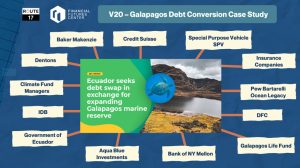Climate-induced loss and damage can affect the macroeconomic health and general well-being of climate vulnerable economies, rolling back decades of development gains. For members of the Vulnerable 20 Group of Finance Ministers (V20) alone, climate-induced losses amounted to 20 percent of their gross domestic product (GDP) over the last two decades.
The United Nations Framework Convention on Climate Change (UNFCCC) has adopted a two-pronged approach to financing loss and damage. First, governments agreed to establish a dedicated Loss and Damage Fund, with negotiations by the Transitional Committee set to conclude by the 28th UN Climate Conference (COP28) in Dubai. Second, governments agreed to invite international financial institutions to incorporate loss and damage into their work. As the global institution charged with maintaining fiscal and financial stability, the International Monetary Fund (IMF) has an important role to play in addressing climate-induced loss and damage.
A new policy brief from the Task Force on Climate, Development and the IMF proposes a ‘loss and damage package’ at the IMF that spans its surveillance, lending toolkit and global policy coordination.
Key policy recommendations:
Surveillance
- IMF surveillance should help governments estimate financing needs required for climate-positive investments and identify their sources and instruments.
- As a part of its multilateral surveillance efforts, the IMF could help to quantify the economic impacts of loss and damage. Surveillance should also be expanded to include slow onset events in addition to extreme weather events.
- The IMF should support governments in building the data infrastructure on loss and damage so that governments can align public expenditure and investments towards development and climate change goals.
- The IMF should ensure that fiscal impacts of climate risks and stepwise resource mobilization are integrated in Debt Sustainability Assessments.
Lending Toolkit
- IMF-held trusts should be expanded in scope and scale to include loss and damage, and eligibility to these trusts should be widened to ensure that all climate-vulnerable economies are able to access concessional resources to build climate resilience.
- The IMF should also incorporate climate resilient debt clauses into its lending programs to enable climate vulnerable countries suffering from climate-induced events to focus on rehabilitation, recovery and rebuilding. Pre-arranged and trigger-based funds will be crucial to ensure the predictability of support.
- Loss and damage should inform the assessment of the adequacy of the Fund’s resources.
Global Policy Coordination
- The IMF should emphasize the importance of concessional finance in closing the financing gap in climate-vulnerable economies and the crucial role that international assistance plays in helping countries make ex-ante investments to build resilience and preserve fiscal health.
- The IMF should foster consensus around international taxes on fossil fuels as a new source of revenue to finance loss and damage. Support to diversify economies will be crucial for economies heavily reliant on fossil fuels.
- Given the positive experience with the IMF’s Special Drawing Rights (SDR) allocation amounting to $650 billion, IMF members should agree on a new SDR allocation devoted to loss and damage and help re-channel SDRs through multilateral development banks to support resilience building.
- The IMF should maintain close coordination with climate vulnerable economies, such as the V20.
With the call by the UNFCCC process to embed loss and damage into the wider international financial architecture, the IMF has an important opportunity and responsibility to play a critical role in safeguarding against climate-induced impacts.




